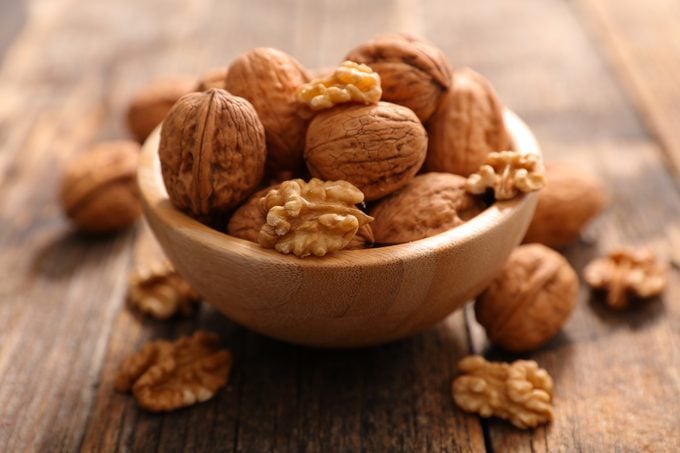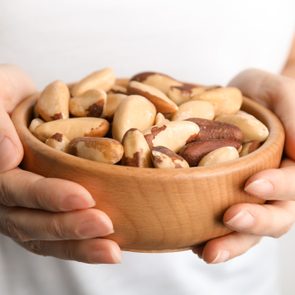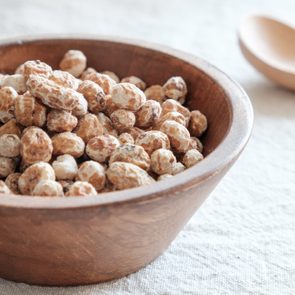Should You Eat Walnuts? Here Are 12 Walnut Benefits to Know
Updated: Mar. 16, 2022
Walnut benefits range from lower cholesterol to healthy brain function. Here's what you need to know about this bite-size natural snack.
Walnuts: A low-carb snack
Walnuts are a holiday favorite, making an appearance in lots of seasonal cakes, cookies, and candied treats. But when eaten without all the sugar, they’re actually good for you—the perfect healthy snack for adults throughout the year. “Walnuts satisfy our need to snack because of their flavor, texture, and snack-ability of hand-to-mouth action,” says registered dietitian Libby Mills, RD, a spokesperson for the Academy of Nutrition and Dietetics. They’re also a low-carb nut to snack on.
Nuts in general offer health benefits, but research suggests walnuts have specific nutritional properties that may fight disease. Although many walnut studies are funded by walnut growers’ organizations, much of the information gathered is strongly supported. The American Heart Association (AHA) even certified walnuts as a “heart-healthy food” (look for the red heart and checkmark on the label). When eaten in moderation, nuts, including walnuts, can only help the body, as the registered dietitians we spoke to agreed. They’re simply one of the healthiest nuts you can eat.
The rising popularity of walnuts
Walnuts are native to Central Asia. Today, the world’s biggest producers are China and the United States, with the majority of America’s walnuts coming from California. Nut sales in general, and walnuts specifically, have been trending up over the past decade as consumers are looking for more plant-based foods. According to the International Nut and Dried Fruit Council, walnut production increased by 37 percent from 2009 to 2019.
Walnuts’ nutritional value
Walnuts are made up of fat (65 percent) and protein (15 percent). As previously mentioned, they’re a low-carb snack. For one ounce of walnuts (about 14 halves), here’s the nutritional info, along with Daily Values (DVs):
Calories: 185 (8% DV)
Total fat: 18.5 g (27% DV)
Fiber: 1.9 g (7% DV)
Protein: 4.3 g (8% DV)
Carbs: 3.9 g (1% DV)
Sodium: 1 mg (0% DV)
Potassium: 125 mg (3% DV)
Walnuts may be high in fat, but it’s the healthy kind that’s packed with omega-3 fatty acids. This makes them a great way to get more omega-3s without eating fish.
“Low in carbohydrates, walnuts also have alpha-Linolenic acid (ALA), which converts to (omega-3s) EPA and DHA in the body,” Mills says. Omega-3s helps reduce inflammation that can lead to heart disease, cancer, and more.
Here’s a look at how walnuts may benefit your health.

Potential walnut health benefits
Lower cholesterol
Research, including a study published in 2017 in Nutrients, found that participants who ate a walnut-rich diet lowered their cholesterol over an eight-week period. A study published in a 2018 issue of the American Journal of Clinical Nutrition also found that those who ate a walnut-enriched diet improved their cholesterol. Why? “The good fat in walnuts can lower LDLs (low-density lipoproteins), or bad cholesterol, and triglycerides,” Mills says. Plus, “manganese helps in the metabolism of cholesterol.”
(Also, check out these other foods that lower cholesterol naturally.)
Lower blood pressure
Walnuts’ good fat may also help lower high blood pressure. A study published in 2019 in the Journal of the American Heart Association found that in addition to reducing cholesterol, participants who ate a walnut-rich diet experienced a reduction in hypertension as well. “A polyunsaturated fat, alpha-Linolenic fatty acid helps our blood vessels relax,” Mills says.
Plus, the vitamin E in walnuts may prevent plaque from building up on blood vessel walls, says Mills. (Plaque narrows blood vessels and increases blood pressure.) In addition, “magnesium helps regulate blood pressure,” she says.
Good for your heart
The result is a healthier heart. “Walnuts are a rich source of omega-3 fatty acids, which offer anti-inflammatory benefits and may help improve cardiovascular risk factors by decreasing LDL cholesterol and blood pressure,” says registered dietitian nutritionist Kristen Smith, RDN, a spokesperson for the Academy of Nutrition and Dietetics. A study in a 2016 issue of JAMA Internal Medicine shows that blood biomarkers of omega-3s are linked to a lower risk of dying from a heart attack.
In addition to being certified as heart-healthy by the AHA, the U.S. Food and Drug Administration allowed a qualified health claim that eating walnuts may reduce the risk of heart disease.
Not only does polyunsaturated fat reduce inflammation, which can lead to heart disease, it also benefits the heart by replacing other unhealthy fats. “When saturated fat is displaced by polyunsaturated fat, our risk of heart disease, stroke, and heart attack goes down,” explains Mills.
Reducing the unhealthy saturated fat in animal products is one reason to move toward eating a more plant-based diet.
“Walnuts have protein and can help size down the amount and frequency we eat red meat,” Mills says. “Research has shown that eating a serving of processed or unprocessed red meat a day increased the risk of heart disease by 12 percent.”
Lower diabetes risk and better blood sugar control
Heart health is closely linked to diabetes risk. A study published in November 2020 in JAMA Network Open found that the heart-healthy Mediterranean diet, which includes nuts, was associated with a 30 percent lower risk of diabetes in women. Snacking on walnuts is one of the best eating habits to prevent diabetes.
Walnuts may also have benefits for those who already have the disease. “With diabetes, there is an increased risk of heart disease including elevated cholesterol, triglycerides, high blood pressure, and stroke,” Mills says. “Walnuts may be beneficial to the health of individuals with type 2 diabetes as they could aid with blood pressure and cholesterol control.”
Plus, walnut oil may help people with diabetes manage their blood sugar, according to research published in a 2016 issue of the International Journal of Endrocrinology and Metabolism. “Walnuts are a low carbohydrate food, so they could replace other, higher carbohydrate foods and help with blood sugar control,” Smith says.
Manage weight gain
Walnuts keep you full longer, which helps prevent snacking on less-healthy foods. “While walnuts are a calorie-dense food choice, some preliminary research indicates they may aid with weight loss,” Smith says. “Walnuts contain higher amounts of several satiating nutrients including fiber, protein, and heart-healthy fats. Nutrients such as fiber and protein take a longer time to digest, thus leaving you feeling full for a longer period of time.”
Mills says another reason walnuts may help with weight control is that they keep blood sugar steady. “One way we are satisfied is because fluctuations in blood sugar between meals is more sustained,” she says. “Feeling satiated longer and satisfied between meals can help us lose weight.” Snacking on walnuts can also help us avoid more refined, less nutrient-dense foods, she says.
More energy and less inflammation
If you need any more ways walnuts may help with weight, Mills has another. “Walnuts contain several nutrients that are needed for metabolizing macronutrients and energy,” she says. Those include manganese, thiamine, folate, and copper.
“Having energy helps us stay alert throughout the day,” she says. “Feeling tired can trigger choosing foods that provide quick energy—like sweets and refined carbohydrates—while setting us up for a roller coaster of cravings. Having energy helps us feel like exercising, and will fuel our activity.”
Coming full circle to the other health benefits, maintaining a healthy weight is another way to prevent heart disease and diabetes.
“Being overweight, obese, and especially carrying weight around the middle can both contribute to inflammation as well as decrease insulin sensitivity,” Mills says. “The more insulin resistant a person gets— that, too, can contribute to inflammation.” (These are the food rules of an anti-inflammatory diet.)
Protective against cancer
The antioxidant and anti-inflammatory goodness of walnuts may also reduce your risk of cancer. “Walnuts are one of the nuts most researched in regard to cancer prevention,” Smith says. “Specifically, components of walnuts may play a role in reducing oxidative stress, inflammation, and gene expression that can be associated with certain cancers,” she says.
Many studies on walnuts and cancer prevention have been done in rodents. But one study in humans, published in 2015 in Gynecologic and Obstetric Investigation, found that eating nuts—including walnuts— reduced the risk of breast cancer two to three times, even after controlling for other risk factors. A very small study in a 2019 issue of Nutrient Research suggests that the tumors of breast cancer patients who consumed walnuts had changes in gene expression—meaning walnuts may have actually slowed the tumors’ growth.
How do walnuts do this?
“If not deactivated, free radicals can react with oxygen and create a new molecule that might contribute to our risk of cancers,” Mills says. “In addition to phytochemicals in walnuts, specific nutrients play an active role in deactivating free radicals. Walnuts give us tocopherols in vitamin E that act as an antioxidant. Copper and manganese also play an important role in preventing oxidation,” she says. Mills adds that magnesium, phosphorus, and folate also help cells get the recipe right for making new cells.
Brain function and healthy aging
The same omega-3s that fight other diseases might also help keep your brain and body strong as you age. “They have been shown to be especially important in the neurological and brain development of humans,” Mills says. In addition, other nutrients such as copper and vitamin B6 help neurotransmitters work effectively, she says. Walnuts are one of the brain foods that will make you smarter.
The Walnuts and Healthy Aging study, published in 2020 in the American Journal of Clinical Nutrition, suggests that walnuts may slow cognitive decline among older people at higher risk. In other research, adding walnuts has also led to a lower risk of a poor diet and decline of physical function in older people.
Improved gut microbiome
The collection of good bacteria in our gut might help keep our body healthy. And some research suggests walnuts may be just the food to boost our biome.
“Early research suggests walnuts may contribute to helpful bacteria in the gut, however this is an area not yet extensively researched,” Smith says. In one study, published in 2018 in Nutrients, participants who ate walnuts showed an improvement of the healthy collection of bacteria in their gut microbiome. Another from 2019 in the Journal of Nutrition found a similar gut improvement that was also linked with cardiovascular benefits.
Risks of eating walnuts
Walnuts are tree nuts, so if you’re allergic to them, you shouldn’t eat them. However, if you’re not sure whether you have a tree nut allergy, here are some telltale signs: difficulty swallowing, itching, shortness of breath, and abdominal pain. Anaphylaxis, a life-threatening condition, could occur, resulting in hives, fainting, and a rapid heartbeat. You should call 911 immediately and use an epinephrine shot (EpiPen) if you have access to one.
How many walnuts should you eat?
It’s important to remember that walnuts “can add up in calories quickly, so try not to eat directly from the bag,” says Smith. “Portion out what you plan to snack on.” Stick to a one-ounce portion, about 14 halves, several times a week. You can also incorporate walnuts into your daily meals or as a meat substitute. “Add walnuts to salads, vegetables, and pasta, or try using walnuts to make mock-meatballs,” Mills says.
Try these 10 meals to make with walnuts and also check out Taste of Home’s 50 crunchy walnut recipes.






















